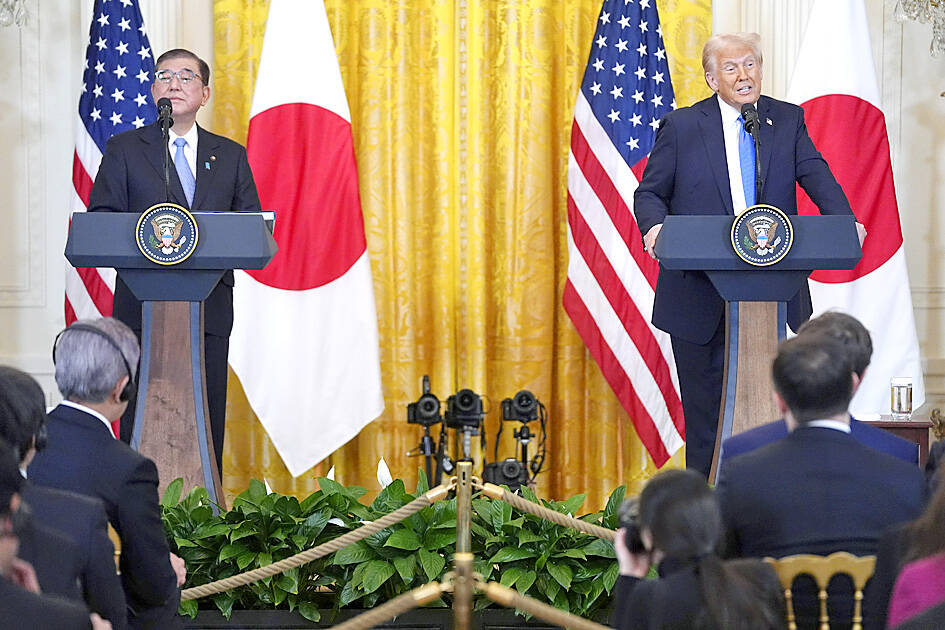The US-Japan joint statement released on Friday not mentioning the “one China” policy might be a sign that US President Donald Trump intends to decouple US-China relations from Taiwan, a Taiwanese academic said.
Following Trump’s meeting with Japanese Prime Minister Shigeru Ishiba on Friday, the US and Japan issued a joint statement where they reaffirmed the importance of peace and stability in the Taiwan Strait and support for Taiwan’s meaningful participation in international organizations.
Trump has not personally brought up the “one China” policy in more than a year, National Taiwan University Department of Political Science Associate Professor Chen Shih-min (陳世民) said in Taipei on Saturday.

Photo: AP
The “one China” policy refers to the US’ policy on Taiwan as stated in the Shanghai Communique, in which the US “acknowledges” the People’s Republic of China’s position that there is “one China, and Taiwan is a part of China.”
That differentiates Trump from former US president Joe Biden and former US vice president Kamala Harris, especially considering Harris reiterated the “one China” policy whenever she discussed matters relating to Taiwan, Chen said.
A number of Republican members of the US Congress have recently called for the president to abandon the policy and establish formal diplomatic relations, he said.
Taiwan has rarely been mentioned during Trump’s interactions with Chinese President Xi Jinping (習近平), he added.
For example, during Trump’s call with Xi one day before his inauguration, Chinese state media reported that Xi brought up Taiwan, Chen said.
However, Trump made no mention of Taiwan on social media about the call and denied related questions in a TV interview, he said.
After winning his first US presidential election in 2016, Trump received a phone call from then-president Tsai Ing-wen (蔡英文) and publicly questioned why the US should be bound by the “one China” policy, Chen said, adding that it showed Trump had considered changing the framework for US-Taiwan relations.
Trump might intend to use the “one China” policy as a bargaining chip in negotiations with China, rather than following policy frameworks he has inherited, Chen said.
Although the US-Japan joint statement did not mention the policy, Trump’s silence on the matter in other situations is more significant, he said.
Decoupling US-China relations from Taiwan would prevent Beijing from using the “one China” policy to influence US policy toward Taiwan, Chen said.
Given that US legislators have also suggested Trump abandon the policy, Taiwan should continue to monitor the Trump administration’s actions in this regard, he said.

Alain Robert, known as the "French Spider-Man," praised Alex Honnold as exceptionally well-prepared after the US climber completed a free solo ascent of Taipei 101 yesterday. Robert said Honnold's ascent of the 508m-tall skyscraper in just more than one-and-a-half hours without using safety ropes or equipment was a remarkable achievement. "This is my life," he said in an interview conducted in French, adding that he liked the feeling of being "on the edge of danger." The 63-year-old Frenchman climbed Taipei 101 using ropes in December 2004, taking about four hours to reach the top. On a one-to-10 scale of difficulty, Robert said Taipei 101

Nipah virus infection is to be officially listed as a category 5 notifiable infectious disease in Taiwan in March, while clinical treatment guidelines are being formulated, the Centers for Disease Control (CDC) said yesterday. With Nipah infections being reported in other countries and considering its relatively high fatality rate, the centers on Jan. 16 announced that it would be listed as a notifiable infectious disease to bolster the nation’s systematic early warning system and increase public awareness, the CDC said. Bangladesh reported four fatal cases last year in separate districts, with three linked to raw date palm sap consumption, CDC Epidemic Intelligence

US climber Alex Honnold left Taiwan this morning a day after completing a free-solo ascent of Taipei 101, a feat that drew cheers from onlookers and gained widespread international attention. Honnold yesterday scaled the 101-story skyscraper without a rope or safety harness. The climb — the highest urban free-solo ascent ever attempted — took just more than 90 minutes and was streamed live on Netflix. It was covered by major international news outlets including CNN, the New York Times, the Guardian and the Wall Street Journal. As Honnold prepared to leave Taiwan today, he attracted a crowd when he and his wife, Sanni,

Taiwanese and US defense groups are collaborating to introduce deployable, semi-autonomous manufacturing systems for drones and components in a boost to the nation’s supply chain resilience. Taiwan’s G-Tech Optroelectronics Corp subsidiary GTOC and the US’ Aerkomm Inc on Friday announced an agreement with fellow US-based Firestorm Lab to adopt the latter’s xCell, a technology featuring 3D printers fitted in 6.1m container units. The systems enable aerial platforms and parts to be produced in high volumes from dispersed nodes capable of rapid redeployment, to minimize the risk of enemy strikes and to meet field requirements, they said. Firestorm chief technology officer Ian Muceus said